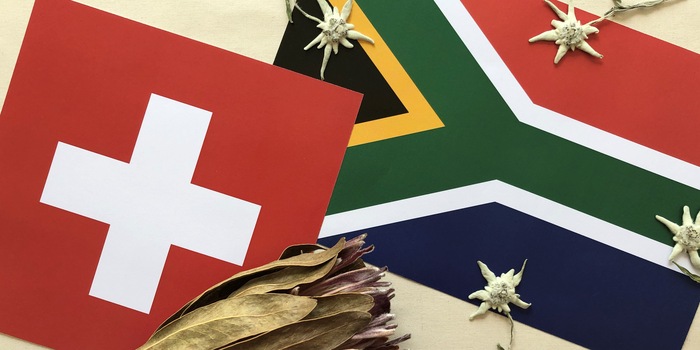

Tales of an ex-expat: from Switzerland to South Africa and back again
When I was four years old, my family left Switzerland for Lesotho before moving to South Africa (SA). I spent the better part of three decades there before returning to my birth country. Here are some reflections on putting – and sometimes smashing – together the pieces of the multicultural puzzle in my brain.
Some people have asked me if I feel more South African or more Swiss. Usually, I hesitate to answer. You’d have to define what it means to be Swiss or South African. Both countries are multicultural, so it’s hard to define what the average inhabitant is like, and there are some other similarities too...
Time warp
Initially, I was taken aback by Swiss people’s habit of mentioning exact times, to the minute. Often, in an informal setting, I’ll just round up to the nearest quarter hour. Of course, I quickly learned to ditch that imprecise habit where public transport of any kind is concerned.
In Switzerland, trains and co. are safe, expensive and very punctual – pretty much the opposite of what I was used to. Although my view of time remains quite flexible, my Swiss precision was noted by some of my SA friends, I guess it must have rubbed off from my parents. There, I was known for being mostly early; in Switzerland, mostly late. (This applies especially to social situations – I’m working on it!)
My trick in Switzerland is to get a grasp of who would expect you to be punctual and who’s more relaxed about it. I find people with young kids tend to give guests more leeway. Age can also be a factor in a person’s tolerance for tardiness. After I arrived 15 minutes late for a visit with my grandma, I was greeted with, «Oh, I thought you weren’t coming anymore!»

Back in SA, being 15 minutes late means you’ll probably catch your host still chopping vegetables for the meal or getting out of the shower. A few years ago, I invited some friends to a Johannesburg restaurant for my birthday – I waited
20 minutes for the first guests to show up, even though I had arrived 10 minutes after the agreed-upon time myself.
Kezboard annozances
There are also differences on a more practical level. At my job, I switch between typing in German and English on a German keyboard. For a while, confusingly, I also had a Swiss German keyboard at work too – and if you don’t know what that means, the missing «ß» wreaks all sorts of havoc with the order of the symbol keys. I also don’t understand why the all-important @ sign has adopted a nomadic character – it seems to inhabit a different key on the various keyboard layouts. Anyway, to add more confusion, my personal notebook’s keyboard layout is of the QWERTY persuasion.
I mean, the setup could be worse, but my brain is constantly switching the locations of the Y and Z keys. I’m afraid I’ll be tzping like this until such time that I start using the ol’ QWERTY full-time again. This is an annoyance I did not have to deal with in SA and did not foresee. I spare a thought for all those poor souls who might have to type non-Latin scripts on a Latin keyboard or vice versa.

Unsavoury X-word
Growing up, I was fortunate – or oblivious – enough not to feel like an outsider in the country my parents had settled. I only had a vague inkling of the antagonism between the cantons in Switzerland. My mother once told me about an acquaintance from Schaffhausen who had had an encounter with a cop in Thurgovia (Thurgau) where she was living during her internship.
The incident happened just after she had pedalled through an intersection. The policeman wanted to fine her because she had not put her foot down at the stop sign. She argued with him, saying that her bicycle had come to a full stop behind the line and that the position of her feet should not matter. The man in question got upset, told her not to be rude and demanded to know what she, as a person from «outside», was even doing there... Needless to say, she got the fine but could laugh about the encounter afterwards.
This interaction puzzled me, mostly because I couldn’t imagine why a policeman would care about what a cyclist gets up to – like pedestrians, they’re ignored in South Africa, and often even motorists have free rein to reach their destinations in whatever haphazard manner they choose.
Of course, the notion that someone would treat you that way in your own country - benign as that encounter was - also seemed ridiculous to me in my childish naïveté. I was not fully aware of the repugnant pass laws that had been in place before my family arrived in South Africa.
For over 200 years, the colonial and later state governments of the region forced black people to carry documents that allowed authorities to check whether they had permission to be in a certain place at a certain time. Under apartheid, millions of South Africans were jailed for breaking this law. It was abolished in 1994.
Today, South Africans generally have the freedom to move freely within their own country. This doesn’t mean that you’ll go unnoticed when you move around, though. Some of the provinces are dominated by a single people, speaking one language, so a Tswana speaker from the melting pot of Gauteng, for example, would immediately stand out as a non-local in the Xhosa-speaking Western Cape.
Chameleon tongue
In Switzerland, as in SA, even if you blend in well with your appearance, your cover can still be blown the second you open your mouth. Now, some people might not care much about fitting in, perhaps even deriving some sort of pleasure from being labelled «exotic». Unfortunately, it’s still a sore point for me. Miraculously, I managed to retain a great deal of Swiss German, but I’m still a bit self-conscious about speaking it.
During a co-workers’ farewell last year, someone from a different department remarked, «You don’t sound like you’re from here,»
Heart sinking, I responded timidly, «Well, you see, I didn’t grow up in–»
«Is that a Zurich accent?» he interjected.
Now, I’m not quite sure what that Thurgovian was getting at (if anything), but I was thrilled about that comment. At least he figured I was Swiss.
That said, when I ask people where they think I’m from, the answer varies. Kinder folk tell me that my Swiss German is almost perfect. I don’t quite believe them, but I appreciate the sentiment. My High German, unfortunately, is (still) heavily coloured by Afrikaans. This after my brief and somewhat traumatic time at a German school in SA inspired me to erase the typical Swiss inflection and pronunciation from it. Recently my new GP, who it turned out had done six
months of his internship in Cape Town, clocked me in less than three minutes. Balls.
Now living in the German-speaking part of the country, I still don’t quite get the in-jokes about and stereotyping of inhabitants of various regions. I’m not sure if I’m sad about it, to be honest.

Cardboard allergy
Boxes should be used during moves, or for storing your old CDs, not for people. When someone asks me whether I’m Team SA or Team CH, I counter with: «Why does it matter?» If I do opt for one or the other, the asker might ascribe certain personality traits or habits to stereotypes of that culture.
Sure, the country you spend a lot of time in does shape you, but so do your family dynamics, your friends, your genes. I’m not Swiss or South African, the answer is more complex than that: I am me.
Talk to me below: What culture shocks did you experience when you got to Switzerland? Do people ever make assumptions about you based on your roots?
For most of my life, I was among the 2% of Swiss abroad who live in Africa. I still rarely carry cash on me, a habit I’m trying to break as it can result in very awkward situations. Like when trying to settle a bill in a remote mountain-top restaurant. My dream job is to be a forest sprite – since this is rather unattainable, I instead spend a lot of my free time birding or running in the woods.
Interesting facts about products, behind-the-scenes looks at manufacturers and deep-dives on interesting people.
Show all